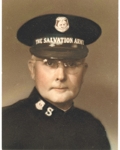By the peaceful shores of Galilee,
Mending their nets by the silvery sea,
The fishermen toiled at their tasks each day,
Till the Master walketh along that way.
CHORUS:
Follow thou Me, He calls again,
And I will make you fishers of men;
As in the days by Galilee,
Jesus is calling you and me.
And they left their nets when they heard His voice,
Making the Master’s call their choice;
And they toiled with Him for the world astray,
To bring men back to the Father’s way.
And the selfsame voice is heard today,
Calling to men in the selfsame way
As the fishermen heard by Galilee:
“Leave now your nets and follow Me.”
Where has God called you to work for Him? Are you there yet? Today’s hymn does imply leaving one’s daily, secular tasks to work only at leading others to Jesus. However, all Christians must be engaged “full time” in influencing others for Jesus and helping meet their needs in His name. This can be done in any walk of life, as we live out our faith in our daily connections with people.
Where has God called you to work for Him? Share on X Sidney Cox, the writer, was educated in business school in Canada and began his Christian life as a Methodist. He eventually became a Salvation Army officer, first in Canada and then in the United States. He was encouraged in his early song writing by William Hawley, in Calgary, and his first song was published in The Musical Salvationist in 1915. Cox taught in Bible colleges and recorded tapes for home Bible study. In his later years he was an independent evangelist in the U.S. He wrote about 400 songs in his lifetime.
Sidney Cox, the writer, was educated in business school in Canada and began his Christian life as a Methodist. He eventually became a Salvation Army officer, first in Canada and then in the United States. He was encouraged in his early song writing by William Hawley, in Calgary, and his first song was published in The Musical Salvationist in 1915. Cox taught in Bible colleges and recorded tapes for home Bible study. In his later years he was an independent evangelist in the U.S. He wrote about 400 songs in his lifetime.
WORDS & MUSIC: SIDNEY COX
S.A. SONG BOOK, 1987 EDITION, # 680; 2015 EDITION, #637
REFERENCES: USAWEST.ORG; HYMNARY.ORG
The Call of Christ/Follow Thou Me
Arranged by Norman Bearcroft
Cornet Soloist: Tommy Wilson, accompanied by the London Citadel Band Bram Gregson, Bandmaster.





